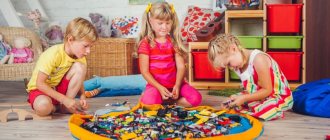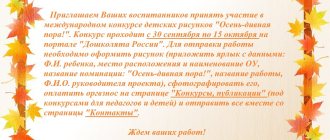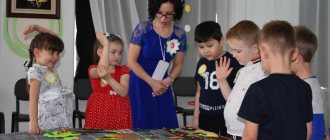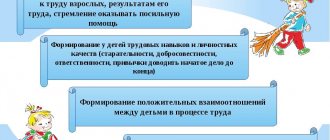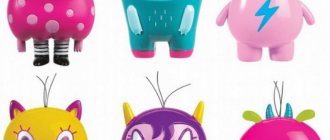How to become your favorite teacher?
Preschool teachers who have close and trusting relationships with their children are confident that their students learn faster and get along better with others. You can’t “force” someone to love, just as you can’t achieve a child’s love by allowing you to walk on the ceiling on your head. The main thing, according to psychologists, is to provide a hospitable atmosphere in kindergarten and treat children with respect. A comfortable environment and environment is the basis for productive activities, healthy development of children and your peace of mind.
Develop close relationships
1. Be a sincere person
It is important to be absolutely sincere in your desire to have a good relationship with your students. Kindergarten students, like all children, are very sensitive to insincerity and pretense. No, they don't get offended like adults, but it makes them feel insecure.
- Are you really happy with your job? If so, feel free to share your genuine excitement and expectations with your students. When you talk to them one-on-one, be sure to tell them how glad you are to see them. For example, when your child enters the locker room in the morning, smile and say, “It’s great to see you again! Let's give each other smiles?" You can try our educational games to create a comfortable and open atmosphere.
- The same mechanism works in the opposite situation. Don't be afraid to tell your students you're having a bad day. Children will still understand and feel your attitude, and therefore clearly tell them why you cannot be as usual today. Children will appreciate your sincerity, and dialogue will help them realize the importance of help and empathy. For example, if you've recently lost a loved one, don't hide it behind a fake smile or brush-off. Everyone around is talking about emotional intelligence, but no one wants to start with themselves. Believe me, a direct answer to the question “Maria Viktorovna, what happened to you?” will not cause injury to anyone, but adults who always hide everything, teaching children to hide their emotions - yes.
2. Show interest in the children’s creativity and activities.
It doesn’t matter whether it’s work in class or extracurricular hobbies that your child talks about after the weekend, show interest in the lives of your students. Ask questions, react emotionally and sincerely.
- If guys know that you care (in a good way) and are interested in their lives, they will share details with you more and more often, which helps to build close relationships.
- Ask often about plans for weekends or holidays. Every Monday, feel free to organize a small “class hour” where you ask the children to tell us what adventures they experienced this weekend. In addition to trust, such conversations will help the child learn to formulate his thoughts, talk and listen.
- Try to find out at least one hobby of your child. Ask them regularly about what they like to do. You can even do your own little research and then share the results with the guys. They will enjoy playing a guessing game; this format can encourage young children to tell more about themselves.
- Find out more about what kids like. Grisha loves dinosaurs, but you don’t know anyone except Tyrannosaurus? Julia is interested in butterflies, but you don’t understand what kind of Morphe Peleid she is talking about? Modern children are unique, they know so many interesting things about the world and are ready to share the story with great joy.
3. Be a Passionate Educator
Not only do students learn better when their teacher is passionate about what they do, but they also like their teacher more. If you are passionate and excited about the topic you are talking about, your children will also feel excited and interested.
- Let work be fun! Some teachers wear costumes when talking about a certain topic or fairy-tale character. In order to interest children, you don’t need to rent a professional costume; sometimes the elements are enough: a hat, a basket of apples and blanket robes.
- A creative and enthusiastic approach is especially important in classes that require a lot of concentration. For example, while preparing for school. Use smartphone apps, colorful flashcards, or real objects to explain math. Alternate tasks with games and, of course, funny warm-ups.
What else should I read?
Steps to the school. How to help your child become a successful first-grader
Diagnostic cards: how to assess the development of a preschooler?
Career guidance at an early age: pros and cons
How to determine the results of preschool education? Development of the national quality assessment system NIKO
4. Laugh with your Kindergarteners
Kindergarteners love to laugh. And believe me, they will feel closer to you if you make them smile and laugh more often. Try to include humor in every lesson (no, this will not turn the process into a clownery).
- Smile more often. When you communicate with your students. Preschoolers imitate the facial expressions they see, so if you smile and laugh, they will definitely do it with you.
- Act out scenes from books, add your own jokes, or create your own handouts and visual materials in which cartoon characters - even Fixies - joke and laugh at something.
- Laughter is a good learning opportunity. Preschoolers can laugh at anything, and sometimes even at things they shouldn't. Explain to the children the boundaries of the funny in order to form conscious and cultured people in the future. The funny shape of the cloud that Bear noticed from the cartoon “Masha and the Bear” is a reason for a skit, but someone’s appearance is not.
Support your students
1. Create a Welcoming Environment
If the guys don't feel comfortable in the room, they won't feel comfortable around you. You need to create an atmosphere in which children feel at home.
- Let cheerful music play in the morning, when the children first arrive at kindergarten. This will make them feel safe and comfortable.
- If you have the opportunity to have a pet, use it; it will be useful for kindergarteners to care for a pet with you. Parrots are the best option, since a rabbit or hamster may simply not tolerate noise and stress. If this is not possible, let the whole group have one large common soft toy. Let children know that she is the one to hug if they are having a bad day.
- Create a bulletin board and mood board so that the kids can share their ideas and significant events: photos from home, drawings, even hearts on stickers. Kindergarteners love to share their experiences with others, but they need an outlet to do so. Pedagogical games that will help develop self-esteem and the ability to love and respect others can be found here.
- Keep all materials organized so that children can easily find them. All class participants will feel safer knowing where everything they need is located. Write and draw on all the folders and jars so that from afar it is clear where the paper, markers, crafts and pencils are.
- Praise the guys for brilliant work, a correctly completed exercise, or simply for a good story told in the group in the morning. Praise means a lot to kids! And in order to save time, use our diploma templates for kindergarten: bright pictures and original poems await you.
2. Be consistent
If children can rely on you, it will be easier for them to love you. To do this, you need to create a stable environment and calm communication.
- If you say you are going to do something, do it. If you tell the kids that tomorrow is a special drawing day, don't forget to organize everything. Children remember everything very well.
- Support your students consistently. If one day you communicate warmly and affably with Katya, and the next you are cold with her, like the Snow Queen, the child simply will not understand what is happening and, most likely, will lose all trust.
- Do you have a schedule? It's better to stick to it. Preschoolers feel more comfortable and secure when they know what will happen next. Let the kids know early in the morning what the day will look like and stick to the plan.
We started our material by saying: “Love for your work and children is not enough,” but in fact this is enough. This love just has to be active.
Now let's move on to the main recommendations for communicating with parents:
Communication is built on the principle “I am an Adult – You are an Adult.”
From the position of transactional analysis (according to E. Bern), the “I am an Adult” position is the most optimal and constructive in business relationships.
Building communication using “I - statements.”
If you want to share with the parent of a certain child if problems of any kind have arisen, then use phrases in the conversation that relate not to which child is bad, but to what you feel, for example: “I’m very worried about Kolya, because lately ….”, “I notice and am concerned that Sveta…..”.
Ask for help from parents, since relationships are built between parents, child and teacher (educator).
Many parents believe that by sending their child to an educational institution, all responsibility falls on the shoulders of the teacher - this is not so. At the very beginning of working with parents, it is necessary to convey information about good performance, desire to attend an educational institution, absence of deviant norms of behavior, etc. are the result of the work of all actors: teacher, child and parents.
If something bothers you about a particular child, you definitely need to tell the parents about it, but pay attention not to the child himself, but to his behavior, actions, actions, etc.
And be sure to start your sentence with positive points regarding this child. For example, “Kolya is a wonderful boy, he is very hardworking, he picks up everything quickly, but lately I have noticed that he is often distracted in class. Let’s think together, maybe he’s worried about something, maybe something is bothering him…….” etc.
As mentioned earlier, it is very important to inform parents about how classes are held, what scheme they are built on, and what children should master during the school year.
Explain to parents and present information (but not from the position of “claiming”, but only conveying information) that there are certain standards by which everyone works.
Be open with your parents, be honest with your parents.
Talk about what's bothering you, but you need to talk about it in a constructive way.
Ask the parents themselves if they have any questions about their children (especially for problem children).
Bring communication between teacher and parents to the level of cooperation rather than mentoring.
This is just in time for the position “I am an Adult”, and not “I am a Parent”. Give feedback, openly talk about difficulties and problems that have arisen, look for solutions together, etc. But! Do not draw conclusions, do not lecture, maintain confidentiality in the information received, do not provoke conflicts.
Today, great responsibility falls on the shoulders of teachers and educators.
The number of children in groups and classes is off the charts. In such difficult conditions it is very difficult to be “in the flow”. In this regard, I would like to note at this point that even if something did not work out or did not turn out the way you would like, do not be upset - this is experience, without it there is no way to learn.
“ Let me quote Aristotle: “Those who have experience succeed more than those who have abstract knowledge.”
Use different forms of interaction.
These can be individual forms (consultations, conversations) and collective (parent meetings, excursions, thematic meetings, etc.).
Every child, like every person, is individual. Try to view any child not from the perspective of a template.
Every person has their own strengths and weaknesses. Study each child.
If parents are dissatisfied with you as a teacher and talk about it en masse and this is quite justified (here you need to be honest with yourself), then you need to reconsider your position in those moments that parents pay attention to.
Manuals for kindergarten teachers
The adoption of the Federal State Educational Standard for preschool education puts forward new requirements for teachers of children's educational institutions. They have to find new effective methods of interaction with preschoolers and apply non-traditional approaches in the use of various visual aids, objects, toys, and modern educational technologies. For this purpose, there are a variety of manuals for educators , which simplify the work of the teacher and help children learn the material more easily and easily.
It is not enough to have a large number of high-quality aids; it is also important to be able to use them competently so that students are interested in receiving information and can successfully assimilate it.
Types of benefits in the work of a preschool institution
In order for educators to effectively carry out their mission of teaching and educating the younger generation, they need to receive a large amount of competent modern information in full accordance with the directions of pedagogical science. This means that in their activities preschool teachers use numerous manuals, which can be divided into the following conditional groups:
- Manuals for training teachers. This is mainly pedagogical literature, textbooks, scientific developments of specialists in the field of teaching and upbringing of preschool children. At them, teachers learn the basics of their profession, gain the most important theoretical knowledge, which in the future they will effectively implement in their practical activities in preschool educational institutions.
- Methodological manuals for educators. This is an official publication that fully complies with the educational program and provides brief, but succinct and important information on a specific topic. It discusses the methods of education and training, that is, this document helps teachers determine the necessary steps and their sequence in working with children to obtain an optimal result. The theoretical side of the issue is considered minimally in the teaching aids, only to the extent necessary for a full understanding and assimilation of the topic.
- A visual aid for educators. These are various images of objects, objects and phenomena (flat or three-dimensional), used for teaching in order to form in students the correct concepts and ideas about the world around them, and to develop specific skills. Visual aids must meet numerous requirements, including selection by age of students, compliance with programs and teaching methods. They must also comply with sanitary and hygienic standards, be safe, aesthetically pleasing and useful for the development of children and the formation of a creative personality in them. Visual aids are among the most diverse things used in the work of a children's educational institution. They are usually divided into the following groups:
- Natural – natural objects.
- Fine – objects of painting, sculpture, graphics.
- Technical - video, audio, filmoscopes, records, televisions, players, computers and so on.
In the work of a teacher and educator, any benefit is of great importance. For one’s own development and self-education, which will later be reflected in practical work with children, textbooks and teaching aids are used. They form in the preschool educational institution specialist a correct understanding of the need to follow a certain methodology and training system, as well as the need to use innovative methods. All this is directly related to the modern attitude to the pedagogy of preschool education and the rejection of old forms, some of which have already lost their relevance, while others need to be revised and supplemented.
The importance of using benefits wisely
For the direct transfer of skills and abilities from teacher to student, the use of appropriate visual aids is of great importance. It is with their help that it will be easiest for a child to master complex concepts, since in this case various sensory groups are connected: vision, touch, hearing, and sometimes even smell. All this contributes to better assimilation, understanding and memorization of the material being studied.
An important role is also played by the fact that the use of such benefits takes place in an easy game form. Children do not feel pressure from an adult, easily absorb information, and have better contact with peers and with the teacher during play. These conditions are provided by a visual aid.
Sometimes teachers and educators have to make them themselves. At the same time, it is important that the finished product meets the specific goal of the preschool educational institution employee, is used taking into account the accepted methods of education and is suitable for children in the age group.
The success of using benefits during classes is ensured by compliance with the following conditions:
- High quality, allowing you to clearly see the object and eye-catching colors.
- Highlighting the main thing, which is especially important when demonstrating various illustrations, as well as competently thinking through and formulating age-appropriate explanations that should be understandable to students.
- Involving children in studying the manual and determining the information contained in it on their own.
At the same time, when doing this work, it is necessary to take into account the following facts:
- Too many benefits will only do harm, since children, due to their age, are not persevering and will not be able to assimilate excessive amounts of information.
- The manuals should be used in a specific order to avoid fragmentation of input and confusion that will not allow children to understand what is happening.
- Before starting classes, technical equipment, devices and aids must be checked and ensured that they are in working order.
- Individual benefits must correspond to the age of the pupils, because the benefits for the middle group will be incomprehensible to children, and the simplest “pictures” will not resonate with older children.
- The environment must be prepared for working with aids, providing sufficient space, good audibility and visibility, clarity of image and sound, and so on.
Taking into account all of the above, it becomes clear that any benefits play a huge role in the activities of the kindergarten teacher and in the work of the entire preschool educational institution as a whole. Educational and methodological aids are selected by the teacher taking into account his needs and the direction chosen for teaching students. Such benefits are also offered by the senior kindergarten teacher. They help make the learning and education process more harmonious and modern.
Visual aids were, are and remain one of the important tools for raising and teaching a child. With their help, you can develop various skills, form new skills and lay the foundations for deeper and more extensive knowledge. The goal of the teaching staff of the preschool educational institution is to select from the mass of proposed manuals exactly those that are best suited to a specific group of children and most accurately correspond to the chosen teaching and upbringing method in a preschool institution.
Let's consider the main recommendations for interacting with “problem parents”:
Be sure to listen to all the complaints of such parents.
Silently, calmly. Without interrupting him. Give them a chance to talk. Perhaps he cannot do this anywhere else except here. This is not your fault and not your “cross”. Under no circumstances, do not blame yourself for this later and do not take the position of a victim. It just happened that way.
Do not make excuses under any circumstances, as this will fuel the continuation of the conflict.
Answer calmly and politely. Try to answer only in general phrases, without clinging to emotionally sensitive moments of the conversation.
Do not take the position of a victim, no matter what words and insults are said to you.
If you react correctly to all the “attacks”, then he will lag behind you after a few unsuccessful attempts. The attack exists as long as you accept the role of the victim.
Again, using the position of an Adult even in such an unconstructive conversation, you can nullify all the “attacks” of the parent.
Do not react emotionally to the words spoken by the “problem parent.” This way, it will be easier for you to listen to him. This is very difficult, but you need to train the position of an Adult to constructively resolve various types of issues.
If you cannot resolve this issue on your own, invite the “problem” parent to discuss this issue with the head of the preschool educational institution or the director of the educational institution.
“Advice to a young teacher.” Consultation
Isolina Chubukova
“Advice to a young teacher.” Consultation
How difficult it is for a young teacher to start working in a kindergarten! I myself was once a novice teacher and went through the “ Young Teacher ”
.
At night I had nightmares that I was saying something to the children, but they didn’t hear me and didn’t react, in short, they didn’t listen. Much water has passed under the bridge since then, I have met many young educators along the way, and I can tell every educator who goes to a group of children only one thing: do not go to children “EMPTY-HANDS”
.
Of course, it is not necessary to bring something, although no one canceled gifts either. But these gifts for children can be such little things that anyone can do! For example, a beetle in a box, a paper wallet, a beautiful drawing or picture, a small rubber bouncing ball, a flag... And also many different trinkets to look at, which every person can find: badges, postcards, key rings, crayons. Can you imagine if you have such a “magic box”
?
However, I didn’t want to talk about gifts at all today! A little bit off the mark, sorry. The main thing, of course, is not gifts! The main thing is knowledge of many games and the ability to PLAY with children! Fundamental and necessary knowledge! I met with teachers who worked with children, and did not know a single game according to age! Why should children obey and love a teacher Let the games be really any, even from your own childhood! Nobody canceled playing with children! PLAY! One day, an animator was invited to our group for Mark’s birthday. He, working alone for an hour, did not let the attention of a group of five-year-old children of thirty people for a single moment! I ran after the children and clucked
:
“Careful, don’t push!
Take turns, stand behind each other." And the same animator in a Fixik costume ran around the hall, danced with the children like a wizard, took out and took out all sorts of miracles from his big bag: a tunnel, a large parachute, bubbles... A bright Fixik costume in an hour playing with the children was soaking wet.
Fixik's children adored him. They looked into his mouth and did not make noise when he needed it - they danced and squealed at his slightest command. Why were they in love with this hero? Because he PLAYED with them! Because it was fun to be with him! a young teacher comes to us with a centimeter manicure, heels, a miniskirt and hanging hair pasta. Moreover, this teacher does not let go of his phone for a minute and communicates online with half the country. A striking contrast with Fixik, right? Of course, these are two extremes. And the image of the young teacher is a bit collective. However, young educators may want to think about this.
What else is very important for a young teacher ? Lots of fairy tales, nursery rhymes, poems, riddles for children. It is important. But all this knowledge will go down the drain if you speak to children in a boring, monotonous voice. EXPRESSIVE SPEECH! No one will listen to you if you talk to children in a boring way. the teacher’s non-standard moves , CREATIVITY, INVENTION, FANTASY - and the children themselves will literally look into your mouth, because you wonder what kind of new games and entertainment the young teacher has come up with for them !
PRAISE! Do not miss a single opportunity to praise your children if there is a reason for this.
What if the first few days (or, say, week)
children run around the group in some confusion - you must agree, this is not scary at all, the main thing is that mutual understanding and mutual respect will soon be achieved.
We all understand that the advice I wrote about today is only a small part of what could be advised to young teachers ! Each of us has our own spark, our favorite techniques and methods. young educators about this ! Thank you for your attention!
MAGAZINE Preschooler.RF
Modern forms of work with young kindergarten teachers as one of the conditions for successful socialization of a teacherYulia Sergeevna Urazbakhtina, senior teacher, MADOU "Kindergarten No. 92" Berezniki, Perm region
“Dozens of young teachers worked with me. I became convinced that no matter how successfully a person graduates from a pedagogical university, no matter how talented he is, and if he does not learn from experience, he will never be a good teacher, I myself studied with older teachers...”
A. S. Makarenko
In recent years, statistics have been inexorable: the teaching staff of schools and preschool institutions is rapidly “aging.” Against this background, one of the primary tasks of kindergarten teams is to provide all possible support to those few young professionals who choose the difficult path of teaching.
Recently, the number of young professionals coming to preschool institutions is very small. And therefore, their appearance in the team is a joy for both the leader and the teachers. At the same time, the dissatisfaction of some young educators with their work sometimes lies entirely on the conscience of the administration and, above all, the senior educator.
The task of the manager, senior teacher, educational psychologist is to help young teachers adapt to the new team, to make sure that they are not disappointed in the chosen path.
This problem must be solved taking into account the fact that in his professional development a young specialist goes through several stages:
Stage I - 1st year of work: the most difficult period both for the newcomer and for the colleagues helping him adapt;
Stage II - 2-3 years of work: the process of developing professional skills, gaining experience, finding the best methods and techniques for working with children, forming your own style in work. The teacher studies the work experience of colleagues at his institution and other preschool educational institutions, improves his professional skills by attending open city events: methodological associations of educators, creative reports, etc. All interesting ideas, methods and techniques, on the recommendation of the senior educator, are recorded in the “Creative Notebook”. At this stage, the senior teacher proposes to determine a methodological topic on which the young teacher will work in more depth. Actively involved in demonstrating activities at the kindergarten level;
Stage III - 4-5 years of work: a system of work is being developed, we have our own developments. The teacher introduces new technologies into his work;
Stage IV - 6th year of work: improvement, self-development, generalization of one’s work experience take place.
I would like to note that the passage of a certain stage is very individual for each teacher. Professional qualities largely depend on character and temperament. Therefore, kindergarten administrations must approach each teacher in a differentiated manner. Various forms of work with a young specialist contribute to the development of his cognitive interest in the profession, the active development of techniques for working with children and their parents, and have a positive impact on the growth of his professional significance.
Since stage I is one of the most important and difficult, let us dwell in more detail on the work of a senior educator with a young specialist during this period.
When hiring a young specialist, the head of a preschool educational institution talks with him, introduces him to the job description, working conditions, internal labor regulations, the preschool educational institution's charter, traditions, and determines the workplace. The teacher fills out a form with general information about himself. If possible, a novice teacher is sent to a group where an experienced teacher works, who can be his mentor, give the necessary advice, demonstrate classes, organize children’s outings, etc. No advice, stories, or explanations will help as much as a personal example.
A young teacher undergoes an internship for several days under the guidance of a senior teacher with his more experienced colleague, i.e. they work together with a group of the mentor’s children. During this time, he gets to know the students, parents, assistant teacher, studies the group’s daily routine, documentation, etc. All questions that arise are discussed after the work shift in the presence of the senior teacher.
Carrying out systematic work throughout the academic year to develop mentoring traditions allows:
to practice the content and methods of pedagogical support for children’s development, interaction between parents and teachers of preschool educational institutions, learned during the period of study at the university;
master techniques aimed at uniting the teaching staff and transferring teaching experience from one generation to another.
Acquaintance with talented teachers, experience of innovative activity and its fruits plays an important role in the formation of the pedagogical ideal of a young specialist, and sometimes in its adjustment.
Then come the first days of independent work - the most difficult. And here it is very important to provide assistance to the young specialist, to make sure that the period of admission to work and the first days become for him not a serious test, but a joyful event. We consider solving this problem a priority for our teaching staff. The adaptation of a young teacher largely depends on the psychological climate in the preschool educational institution, management style, professional personal maturity of each teacher, working conditions, etc.
Each preschool educational institution develops its own traditions, its own system of working with young teaching staff, and selects those forms and methods that will ultimately contribute to the further professional development of the young specialist. The subsequent success of the specialist will depend on how the newcomer is greeted by the team led by the leader. In our preschool educational institution, a wonderful tradition has become the holding of the event “Initiation into Gardeners.”
At this holiday, a young specialist undergoes various tests: sings children's songs, lullabies, marches to music, solves problematic pedagogical situations, pronounces the young teacher's oath, etc. The script is prepared by the music director. From the mentor, the newcomer will receive a memo “Rules of conduct and communication for a teacher in a preschool educational institution.” At the end there is a tea party.
About a century and a half ago, the German public figure and creator of kindergartens Friedrich Froebel called a preschool institution a “garden,” believing that a child is like a flower and its development depends on attentive and caring care. And teachers are tireless gardeners, lovingly and carefully growing these treasures
The role of a senior educator in working with young professionals
From the very first day, the senior teacher orients the teacher towards constantly expanding his knowledge, mastering advanced methods and techniques in working with children, and comprehending the secrets of education. One of the main functions of a senior educator is to provide assistance in organizing the pedagogical process.
We build our work with young specialists taking into account three aspects of their activities:
- “Senior teacher - young specialist” - creating conditions for easy adaptation of a young specialist to work, providing him with the necessary knowledge, skills and abilities;
- “Young specialist - a child and his parent” - the formation of the teacher’s authority, respect, and interest in him among children and their parents;
- “Young specialist - colleague” - providing full support from colleagues.
Meanwhile, the main task is to develop special attention to the skills of practical application of the theoretical knowledge acquired by the teacher. Insufficient mastery of these skills forces the beginner to engage in self-education. And here the role of the senior teacher is indispensable, who introduces the young teacher to the equipment and opening hours of the teaching room, and makes a selection of methodological literature and periodicals on issues of interest.
Helping a young specialist inevitably entails an assessment of his teaching activities. The senior teacher should be as tactful as possible in his statements, especially if they are critical. It is important to be guided by Theodore Roosevelt's principle: “Only he who does nothing makes no mistakes. Don’t be afraid to make mistakes - don’t be afraid to repeat mistakes.”
The young teacher feels the need for timely positive assessment of his work. We often analyze the work of a teacher based on external signs. Calm in the group means everything is in order. What is hidden behind this? The main thing is not external discipline, but whether the teacher was able to raise children to be polite, taught them to treat others with respect, and knows how to provide timely help to everyone who needs it. This is what you need to pay attention to first, and, having noticed the pedagogical successes of a newcomer, be sure to note them out loud. After all, praise lifts your spirits, stimulates you, inspires confidence, and increases interest in your work.
In teams where reliance on the positive qualities of the teacher is combined with high demands on him, good traditions, a spirit of high responsibility, comradely mutual assistance, and creative initiative live. In such conditions, the novice teacher quickly and painlessly enters the teaching staff.
A special questionnaire will help determine the strategy and tactics of the senior teacher’s activities in relation to the work of the young specialist.
Forms of work with young specialists
Various forms of work with young specialists contribute to the development of cognitive interest in the profession, active development of techniques for working with children and their parents, and have a positive impact on improving professional activities.
Social adaptation is a constant process of an individual’s active adaptation to the conditions of the social environment, as well as the result of this process. Management style is a set of certain principles, the most characteristic and sustainable methods for solving typical problems that arise in the management process, and methods of communication between the manager and team members.
Socio-psychological climate is a type of psychological climate caused by or influencing interpersonal relationships.
Moral and psychological climate is a type of socio-psychological climate associated with the moral state of the group.
In our preschool educational institution there is a “School for Young Educators”, the purpose of which is to help novice teachers improve their professional competence. Meetings are held once a month according to a plan drawn up taking into account the requests and difficulties of beginning teachers. Experienced, creative specialists are involved in the work of the “School for Young Educators”. The school examines theoretical and practical issues. For a young teacher who has worked for 1-2 months, a discussion is held on the topic “Adaptation of a young specialist in a preschool educational institution.” The teacher shares his difficulties and problems, and the team jointly looks for ways to solve them. Discussions in which controversial issues of pedagogical theory and practice are discussed are a success. Each teacher expresses his opinion and defends it. Open classes are actively used, followed by a discussion of what was seen, and workshops, where theoretical material is supported by examples from practice, showing individual techniques and ways of working.
Issues of education and training are also discussed during round tables with the participation of teacher-mentors.
When conducting classes at the “School of a Young Teacher”, various techniques are used: solving pedagogical situations, a method of simulating a teacher’s working day, “brainstorming”, solving crossword puzzles. All this allows you to clarify your knowledge on a specific topic and broaden your horizons.
Awareness of one’s own individual capabilities is of great importance in work. Low self-esteem does not stimulate the pedagogical process. In order to organize work on self-knowledge and the disclosure of one’s internal resources, the preschool educational institution operates a psychological circle “Know Yourself”, headed by a teacher-psychologist.
Thus, an educational psychologist first offers a comic test to a young specialist, and then conducts a conversation with him about how he evaluates himself as a teacher in reality and how he sees himself ideally. Such a test, despite its apparent humorous nature, allows one to determine one of the most important qualities for a young specialist - his “pedagogical stress resistance.”
The mentor teacher also fills out a test that will help evaluate the effectiveness of his work.
Modified “Psychogeometric Test” by K.B. Malysheva and V.K. Tolmacheva makes it possible to determine not only the areas of activity, but also the main abilities of preschool teachers, which guide them when drawing up a mentoring program for young kindergarten specialists.
An educational psychologist studies the personality of a young specialist, identifying positive and negative character traits. To analyze the personal sphere, the following methods are used: Eysenck test (the type of temperament is determined), the figure test (the typology of personality is revealed), sociometry (the sociometric status is established), etc. The degree of practical readiness is monitored as a result of observations of the organization of the educational process in the group .
The educational psychologist also conducts consultations, correctional work, business games, trainings, relaxation exercises, music therapy sessions, etc. with the young specialist.
Tips for a senior teacher for successful work with teachers
Systematically improve your work style, analyze and eliminate shortcomings, look for new, more rational forms and methods of activity.
The authority of a senior teacher is determined by his competence and efficiency, general culture, ability to set an example for others in his work,
Learn to make decisions in a timely manner, which should formulate specific goals and objectives of the team’s work that are most relevant at the present time. Decisions aimed at achieving ostentatious results discourage the team and interfere with its cohesion.
Develop and form the ability to win people over. You can attract people with deep theoretical and practical knowledge of child psychology, a friendly, respectful, even and fair attitude towards people, and the ability to help them in their work. Do not forget to promptly acknowledge the initiative and achievements in the work of educators, thank them in the presence of other employees for their good work.
Distribute assignments and tasks among teachers according to their experience, abilities and efforts.
Learn to distribute responsibilities, manage and control, encourage and discipline, rely on the strength of public opinion of the team. Demand must be systematic. Occasional demands are fraught with conflicts and do not produce the desired results.
Give orders in the form of instructions and requests. They must be extremely clear and precise. State the requirements for the quality of work, its volume and deadline.
Disciplinary requirements must be the same for everyone. Set requirements for the quality of work taking into account the teacher’s capabilities. Unbearable demands cause protest and spoil people's mood. The main way of understanding a teacher is observation and analysis of his activities. Judge people solely by their deeds.
Never lose your composure. Outbursts of irritation affect the teacher less than a calm, tactful analysis of his behavior. Inconsistency and loudness are evidence of low culture, a sign of his weakness, not strength.
Creating a cheerful, cheerful atmosphere in kindergarten primarily depends on you and your behavior. The mood of teachers depends on the success of their work, the warmth of communication and mutual assistance in the team. Equal treatment of all team members is one of the main conditions for cohesion. Be optimistic and do not lose courage in difficult situations: this gives educators confidence in the success of the task.
| Next > |
